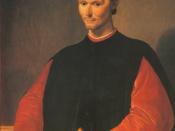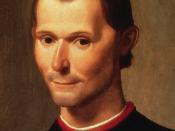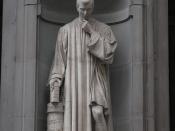Real Machiavelli
"Murderous Machiavel" was how Shakespeare referred to him; others in the 16th century used the satanic label "Old Nick" for the crafty philosopher. In 1827, Lord Macaulay, poet and philosopher, wrote that he doubted "whether any name in literary history be so generally odious." In this century, the left-leaning philosopher Bertrand Russell dismissed Machiavelli's masterpiece, The Prince, as "a handbook for gangsters." The 10th edition of Webster's Collegiate Dictionary informs latter-day students that "Machiavellian" means "marked by cunning, duplicity or bad faith." (Curry 5) After these, Machiavellianism has come to represent corrupt, ambitious, totalitarian rule, where the end justifies the means. Although all of his notoriety as being the symbol of immorality, in fact he is a misunderstood thinker and he is one of the most successful and genius philosophers ever lived because of his objectivity and his invaluable ideas as well as political and social reasons.
Machiavelli was very patriotic and wanted Italy to reach its full potential. He had many hopes for Italy and spent most of his life working towards them. Machiavelli understood the reality of the chaotic situation in Italy and tried to find alternative ways to correct it. He had seen corruption, deceit and ruthlessness in government and knew how and why it existed (Allen 449). He had analyzed how to be an effective dictator because it is rather distasteful. But Machiavelli accepted the predicament and tried to understand the political and personal interactions that kept it going. As living in the Renaissance age, he was a seeker of freedom and democracy. He said in his Discourses and other books except The Prince, the best way to rule a country is democracy, but it cannot be applied to all countries. In non-modernized countries such as Romagna and Florence, it is...


